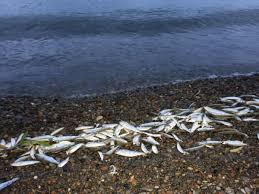Toronto — Videos and photos showing piles of dead fish along the shores of Lake Ontario have sparked concern among Toronto residents, but experts insist this phenomenon is a natural occurrence tied to seasonal changes. The Ministry of Natural Resources (MNR) has confirmed that the fish are alewives, a species in the herring family, commonly found in the lake.
The die-off, witnessed at spots like Marie Curtis Park and Humber Bay Park, has led to speculation online, but scientists say the fish deaths are the result of environmental stress factors that frequently occur in spring.
“It is stressful for the fish, because a lot of fish are spawning in the spring,” explained Janet Koprivnikar, a biology professor at Toronto Metropolitan University. The fish, which usually dwell in deep cold waters, come to shallow areas during May and June to spawn. Rapid temperature changes, low oxygen levels from the winter, and spawning fatigue can all contribute to the die-off.
This winter, experts say, was colder than previous years—a contributing factor. Alewives are particularly sensitive to environmental changes. According to Rick Portiss from the Toronto and Region Conservation Authority, cold-water upwellings caused by wind or storms can shock the fish and lead to mass deaths.
University of Toronto ecologist Donald Jackson added that the alewives’ vulnerability also depends on how well-nourished they are heading into winter. Invasive species like zebra and quagga mussels, which deplete food sources in Lake Ontario, have further weakened the food chain for alewives.
Despite the visual shock, officials and scientists agree that there is no major public health risk. The fish will largely be eaten by scavenger birds like gulls or decompose naturally. However, residents are advised not to touch the fish or allow pets to interact with them, as bacteria from decomposition could cause health issues.
While unpleasant and odorous, experts maintain that this springtime event is part of a recurring cycle in the region. “Messy, unpleasant, yes,” said Koprivnikar, “but not usually anything to be concerned about.”
Natural Die-Off Leaves Scores of Fish Dead Along Lake Ontario Shores, Experts Say It’s Seasonal

